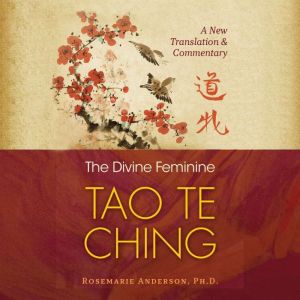Quotes
“Rosemarie Anderson’s translation of the Tao Te Ching is perhaps the truest reflection of this ancient text, which refers to the Tao not in an impersonal way but in a feminine way. Anderson’s contemplative approach also adds to technical accuracy--the lyricism, beauty, and mysticism of the original way the verses were performed. Her stunning achievement revitalizes this venerable wisdom and powerfully evokes its deeper meanings.”
“Centering on the Tao as ‘womb of the universe’ and Te as both ‘virtue’ and potentiality, Rosemarie Anderson gives us a delightful ease of engagement with the ancient Chinese wise sayings. Her embodied approach is heart-opening; the crisp, direct lines are invitational; and the artful spacing of the layout adds to the beauty. I feel at home in this translation. And more to the point, it’s exactly what we need now that things are falling apart. Peaceful means could further our survival.”
“Rosemarie Anderson’s unique translation of the Tao Te Ching allows us, for the first time, to experience the mystical feminine essence of the Tao--a combination of the power and tenderness, exhortation and patience of the Divine Mother--and invites us to walk the path of transformation for ourselves. Rosemarie translates like a poet--lingering, listening into the rhythm and texture of the words, allowing each phrase to speak its wisdom. And that’s exactly how you should read this book. In doing so, your relationship with the Tao will be forever enriched.”
“A lovely book. A good translation is a journey, and this translation is a journey worth taking. e Tao may be an ancient landscape, but the trails on which we’re invited to follow the translator are always new.”
“As a classic of world literature, the Tao Te Ching seems to unfurl its majestic layers of wisdom anew for each new generation. Professor Anderson has contributed incisively to its history by giving us a layer that speaks eloquently and urgently to our age: the feminine nature of the Tao. As if sitting in the depths of the poetry for centuries waiting to be awakened, the feminine can now speak of her paths and insights that radiate so finely through this new translation. It is rare indeed that a scholar excels in diverse fields; having blazed a creative and influential trail in transpersonal psychology over recent decades, Anderson has now aspired to the challenge of translation. All translation is also interpretation, and Anderson’s sensitive grasp of the wisdom in the Tao will benefit all who read this work.”
“While I have purchased a dozen or more translations of the Tao Te Ching over the years and have found its verses beautiful and practical, Rosemarie Anderson’s version deepened my appreciation for this classic book by drawing my attention to the lyrical, mystical, and feminine nature of the verses--perspectives never before described with such depth and authority. Anderson makes a persuasive case that the Tao is female in nature, and this realization illumines portions of the work that would otherwise be ignored. She also reminds us that the verses were often sung by ancient bards, a provocative practice that her readers can attempt themselves. When I am asked which translation I would recommend to novices, I will not hesitate to choose this one.”
“Rosemarie Anderson eloquently gives voice to the feminine soul of the Tao Te Ching. With a profound and in-depth understanding, she reveals the graceful connotations and helps us to experience the beauty and wisdom in the verses. Her commentaries bring new insight to an ancient text full of esoteric knowledge pertinent to the challenges of our modern world.”
“Anderson, professor emerita of psychology at Sofia University, translates and delivers a fresh take on the Tao Te Ching, keeping an eye on the feminine characteristics of the text. Anderson argues this concept of wei wu wei (or ‘action that is non-action’) is inherently feminine, ‘portrayed as the mother, virgin, and womb of creation’ and driven by ‘tenderness and selflessness.’ Some of Anderson’s evidence is persuasive--such as the many metaphors of the womb and mentions of the Tao creating life--and justify her approach of using female pronouns to identify the Tao throughout....Anderson’s attention to detail and creative interpretations will open this ancient text to a new audience.”
"In her introduction, Rosemarie Anderson shares her journey that culminated with her sitting down and doing her own translation of the Tao Te Ching. She shares her genuine surprise at how overtly feminine the Tao was in her translation. After reading The Divine Feminine Tao Te Ching I reached for my other two copies of the Tao, one from 2008 translated by James Legge and the other from 1993 that was translated by Man-Ho Kwok, Martin Palmer, and Jay Ramsay. And whoa yeah, there are many differences between the three texts. In the divine feminine defense of the other two, they both did translate some phrases in a more feminine way, but none to the extent of Anderson’s translation. However, it’s not just the overtly feminine translation that makes The Divine Feminine Tao Te Ching my favorite. Anderson’s presentation of the text is more poetic and lyrical than the others I read. It flows better when being read, and I suspect sounds wonderful read aloud. It lends itself nicely to being read repeatedly, and the Tao Te Ching is a text that is meant to be repeatedly read and reflected on. All of this is to say, The Divine Feminine Tao Te Ching by Rosemarie Anderson will be my definitive translation of the Tao going forward."
"By Anderson’s own account, it’s clear that the translator did the requisite work of becoming fully immersed in Chinese culture, spending years abroad to understand its history in order to deeply embody the language. Her practice of contemplation was guided by the Tao’s essential lesson of “wei wu wei:” act without acting, know without knowing. By listening and feeling deeply, Anderson allowed the ancient text to reveal timeless lessons to unveil a feminist perspective for Western seekers of wisdom."


![]()

